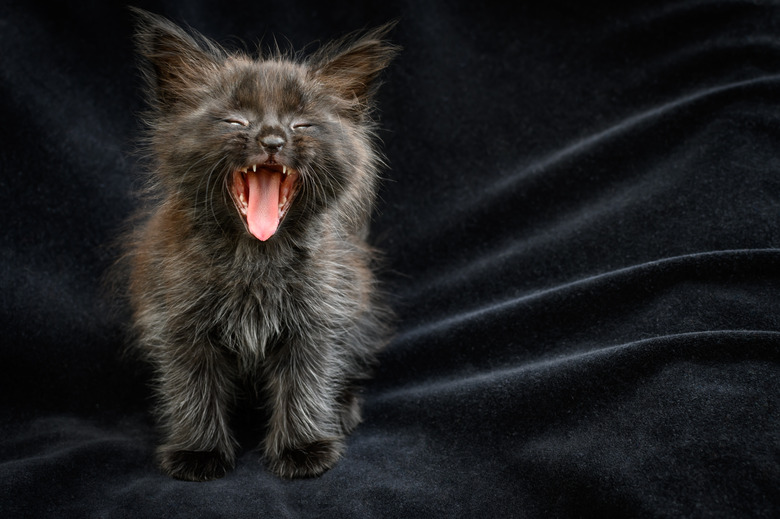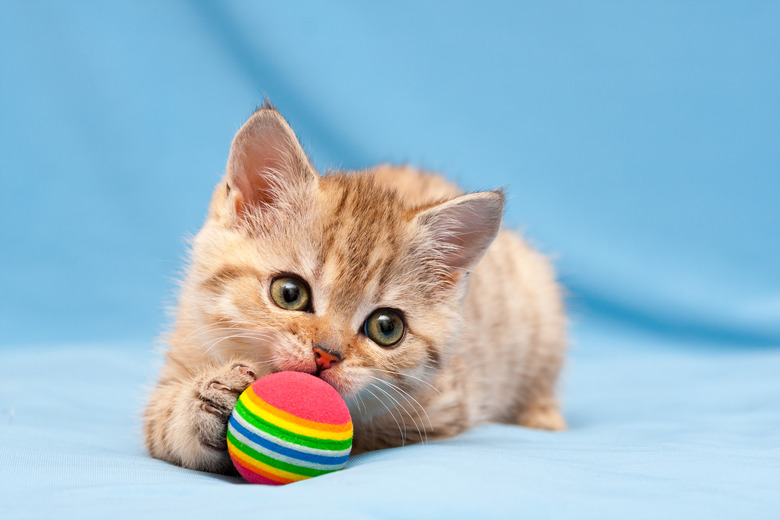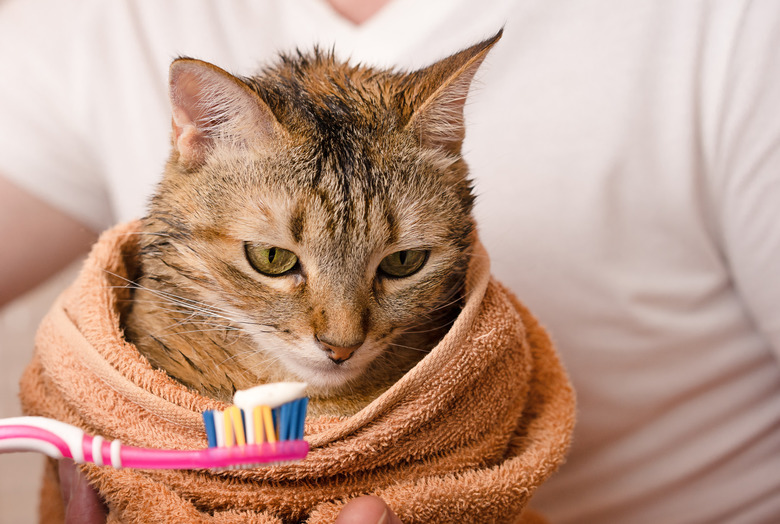The Complete Guide To Kitten Teething
Cats, like human babies, start off life without visible teeth. Their baby teeth (also known as milk teeth or deciduous teeth) grow at around 3 weeks of age. By between 10 weeks and 6 months of age, those initial baby teeth are replaced with adult teeth. The state of a cat's teeth and gums are a good indication of overall wellness. Knowing the timeline of kitten teething can help cat owners support their kittens in this critical early development.
Kitten teething timeline
Kitten teething timeline
Kittens are born without visible teeth, just like humans. Kittens appear toothless when they are born. Baby teeth grow between 2 and 3 weeks of age. By around 3 weeks of age, their initial set of teeth has erupted from their gums. Kittens can start teething as early as 10 weeks. They will typically gain all their permanent teeth by between 6 and 7 months of age.
It is normal for teeth to grow in at different rates, and cat owners shouldn't be alarmed. Though cat parents may want to contact their veterinarian if a significant number of teeth are still missing around the 10-week mark. This period of gaining the baby teeth is the first of two teething periods for kittens.
The second teething period can happen between 10 weeks and 7 months of age. Kittens have 26 initial baby teeth. Later cats go on to develop 30 permanent adult teeth. It is normal to notice loose teeth on the floor. While cats are generally tolerant of the discomfort that comes with gaining their adult teeth, many of the symptoms and behaviors of uncomfortable teething occur during this second period.
Kitten teething symptoms and behaviors
Kitten teething symptoms and behaviors
Keep an eye on your teething kitten as they gain their adult teeth and take note of any signs of dental discomfort during the teething process including:
- decreased appetite: eating kibble or even wet food can be painful in a sensitive kitten's mouth. A cat may avoid food to cut down on their discomfort.
- increased chewing behavior: some cats find the sensation of a hard chew to be soothing. A kitten's increase in chewing can indicate their teething has begun.
- inflamed gums: as adult teeth erupt, they may crowd the mouth and overlap the baby teeth. This creates pockets ripe for bacteria.
- overall irritability: cats may be more touchy than usual during teething due to feeling uncomfortable.
What to do if your kitten's adult teeth take too long to descend
What to do if your kitten's adult teeth take too long to descend
Normally, the adult teeth, or teeth buds, form in the jaw and gums above the baby teeth. Then, the baby tooth associated with the adult tooth falls out. Though occasionally, a baby tooth can be absorbed into the gums and not fall out. This is known as persistent deciduous teeth. In this case, the adult tooth may erupt late, at an abnormal angle or position. Having two teeth in the same tooth socket can cause a number of problems for a kitten, including:
- bad breath or gingivitis: both of which can be caused by food buildup between the teeth.
- weakened teeth: are caused by the rubbing of two malpositioned teeth against each other. This wears away at the enamel.
- jaw development problems: though rare, can be caused by malpositioning and dental interlocking between the teeth.
In most cases, your veterinarian will recommend tooth extraction to make space for the adult teeth. A tooth extraction is most successful if it is done early.
Create a kitten teeth care routine
Create a kitten teeth care routine
If pet owners can get their new kitten used to a dental routine that includes regular brushing, they can keep their cat healthy at home. Cat owners can begin brushing their cat's teeth at just a few months old to develop their care routine.
After finding a cat toothpaste, which is usually fish-flavored, let your cat inspect the toothpaste and the toothbrush. If they are able to tolerate further handling, brush their teeth! It doesn't take long — less than a minute is sufficient. Other things that can help your kitten's teeth care routine are:
- regular toothbrushing: as described above, with cat-specific toothpaste.
- buying kitten teething toys: using chew toys at playtime can help prevent the buildup of tartar. They come in a variety of flavors, including catnip.
- using small amounts of dental rinse: can also help to treat the buildup of plaque.
- feeding your cat a dental diet: dry cat food can sometimes improve dental health through chewing. However, most dry commercial cat food contains sugars — which can lead to tartar buildup. Ask your veterinarian if regular kitten food is sufficient or if a dental diet-formulated food can benefit your kitten's dental health.
Of course, all teeth care should be supplemented with regular checkups with a veterinarian. Pet parents can help their kitten's dental health by checking their kitten's new teeth and jaw development weekly. This should be done until the kitten is past the teething stage at around 8 months old.
The bottom line
The bottom line
Kitten teething happens in two phases. The first is when a kitten's first set of teeth comes in at around 3 weeks old. The second phase is between 10 and 7 months when their baby teeth are replaced by an eventual full set of adult teeth. Teething can cause discomfort for kittens though their symptoms can be managed. A pet-appropriate toothbrush, toothpaste, dental rinse, teething toy, and dental diet can help a kitten in discomfort. Regular dental care and observation at home are important for this life stage. Visits to a veterinarian on a regular basis can help your kitten's dental health. They will check a kitten's teeth and jaw development through the teething process. This should be completed on a weekly basis until the kitten is about 8 months old.


